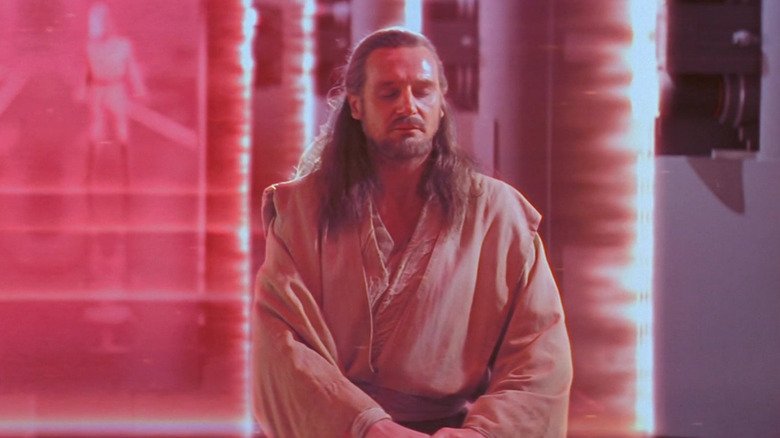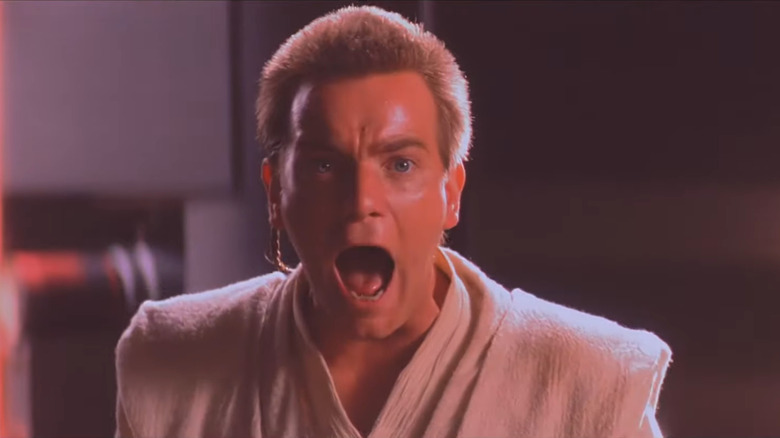How Liam Neeson Really Feels About Qui-Gon Jinn's Star Wars Death
He may be ignored by most of the "Star Wars" fandom, but Qui-Gon Jinn (Liam Neeson) was one of the coolest parts of "The Phantom Menace," the first (or fourth) episode in the "Star Wars" saga. In a movie that's often characterized as being way too talky and meandering, Qui-Gon kept things to the point. He was direct and stoic, wise and gentle. He had a wholesome relationship with young Anakin (Jake Lloyd), and there was never any doubt that he was a good mentor to young Obi-Wan.
Despite this, Liam Neeson wasn't particularly happy with how Qui-Gon went out. Near the end of "The Phantom Menace," in perhaps the movie's only scene with some genuine emotional pathos to it, Qui-Gon is slain by that dastardly Darth Maul. Maul stabs him through the stomach with his dual-bladed lightsaber, and leaves him dying on the floor. It's a tragic end and, as Neeson put it, an undignified one.
"I thought my death was a bit nappy-pappy," he complained in a recent GQ interview. "I'm supposed to be this Jedi Master. My character fell for that 'oh I'm going for your face, sike I'm going for your stomach!' Oh, please. Hardly a master Jedi then."
Qui-Gon's death is even more embarrassing when you consider that Darth Maul's dual-blade lightsaber is incredibly inefficient for any kind of serious battle. His lightsaber has barely any of the flexibility of a regular one, as he can't even attempt a straightforward stabbing motion without cutting himself in the process. And, as any kid who's tried to win a play-lightsaber battle using a Maul-style saber can tell you, fighting with a dual-blade saber is an easy way to get hit in the hands a lot. The fact that Qui-Gon couldn't win this fight despite his opponent handicapping himself like this? Disgraceful, I'd say.
Why Qui-Gon's death was so important, even if it was silly
Although Qui-Gon died a little too easily for Neeson's tastes, that doesn't distract from the impact his death had on both Obi-Wan and Anakin. If Qui-Gon hadn't died, he would've been the one to train Anakin in the Jedi ways. Instead of being stuck with a young, unprepared Obi-Wan as his master, Anakin would've had the wiser and more patient Qui-Gon instead. There's a very good chance that, in some alternate timeline where Qui-Gon never died, Anakin never would've turned to the dark side and the evil Empire never would've taken over the galaxy at all.
Perhaps most importantly, Qui-Gon represented the pre-Empire Jedi order in its noblest, purest form. The rest of the prequel trilogy presents the Jedi order as being corrupt and complacent. Qui-Gon, meanwhile, is a Jedi of clear mind and sound values, someone who probably would've sniffed out Palpatine's deal early on if he'd lived to have the chance.
And despite Neeson's quibbles with his character's death scene, he does seem to look back on the role fondly. In that same GQ interview Neeson reflected on Qui-Gon's cameo in the 2022 Obi-Wan prequel series, saying, "Oh, it was just one little scene. Obi-Wan's coming in on a camel and sort of said, 'Master, I've been looking for you everywhere,' something like that. And I say, 'I've always been here.' I kind of like that. It was just one line. It was nice to recreate that. To be with Ewan [McGregor] after, I don't know, 18, 20 years. It was sweet."

